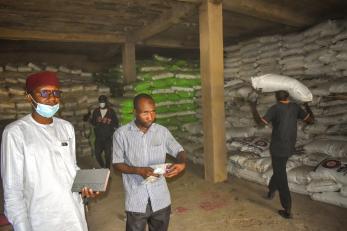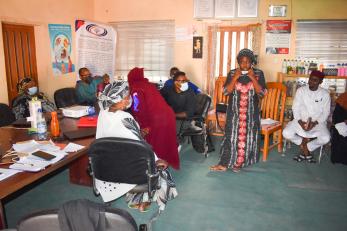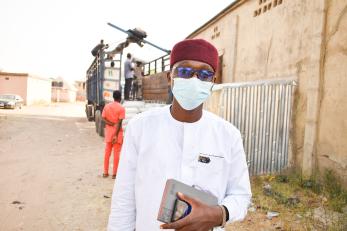Safer use of agrochemical trainee solving challenges of urea transportation in Northeast Nigeria

Computer scientist to agrochemical dealer
The Enterprise Investment Fund (EIF) grant facility of the USAID funded Feed the Future Nigeria Rural Resilience Activity, which was designed to catalyze investments into Northeast Nigeria by encouraging indigenous and non-indigenous organizations to create market opportunities for farmers and microenterprises, has created at least 782 direct jobs for young persons recruited by private sector organizations as agents, who broker relationships with farmers.
One of the young people who has benefitted from the Activity’s partnership with private sector organizations, through the EIF intervention is Ahmed Shamsuddeen, a staff of Motherhen Development Foundation. Ahmed is a computer scientist by training, who joined Motherhen Development Foundation as a volunteer ICT Officer in 2019 and is now addressing a major barrier to farmers’ productivity in the Northeast.
“I was unemployed, the first employment I got after graduation was with Motherhen Development Foundation. The Executive Director gave me a lot of opportunities, sending me to attend trainings everywhere. It was the training I attended with Mercy Corps that changed my status because my mode of thinking changed from there,” said Ahmed during a recent visit to Motherhen Development Foundation.”

Fertilizer (urea) restrictions in the North East due to insecurity
One of the challenges faced by farmers in Northeast Nigeria is the high cost of fertilizer and the scarcity of urea fertilizer, which is highly needed in the Northeast to improve soil fertility. The office for the National Security Adviser (NSA), backed by the military prosecuting the counter-insurgency and counter-terrorism operations in the Northeast, ordered restrictions of the supply of urea fertilizer to the Northeast states to stop the production of improvised explosive devices by the terrorist groups, in 2016.
According to a report by Argus Consulting Services, the new guidance was issued jointly by Nigeria’s Federal Ministry of Agriculture and Rural Development and the office of the National Security Adviser (NSA). Under the new urea regime, every individual, company and transporter must be identified and certified from the point of origin to the final destination.
Responding to the restrictions, Ahmed said, “Urea coming to the Northeast must have an attached waybill with the correct location coordinates of the destination. This includes the details of the truck and its destination, and the truck is tracked all the way to its destination.
“Now it’s (fertilizer) in the store, when a dealer comes, we have our way of giving it to them. Before we proceed, we would get a pass (it’s called SIV) from the security agencies. We would attach it with the location of the dealer because urea is very sensitive in the Northeast here.”

Rural Resilience Activity’s safer use of agrochemical training
Between February 8 and March 7, 2021, Ahmed attended one of the training of trainers in Gombe on safer use of agrochemicals, organized by the Rural Resilience Activity across its four implementation states in the North East. The Activity through the International Fertilizer Development Center (IFDC) and State ADPs (government extension workers) trained a selected group of 104 agrochemical dealers at the local government level, and lead firms in fertilizer and agrochemical businesses, with the aim of improving institutional and human capacity, profitability and competitiveness of agricultural value chains, natural resource management, health and safety conditions and environmental services, and beneficiaries’ net annual income.
“I attended the training with the Rural Resilience Activity early this year. I heard a lot of topics that changed my mode of thinking. They taught me how to be an entrepreneur. When I left the training, I made the decision to join the two careers, Computer Science and Agriculture.
“Then I went to meet one of my mentors, Ahmed Mohammed Dukku, who happened to be the National Secretary, North East Commodity Association (NECAS) and the Chairman, Rice Farmers Association of Nigeria (RIFAN) Gombe State Chapter. He introduced me to the Federal Government Anchor Borrower program. From there, my journey started. I registered my company with CAC, and I got my first supply of Notore fertilizer from Port Harcourt.
Armed is now the State Secretary of the Wheat Farmers’ Association of Nigeria, thanks to the network he built during and after the training. According to him, he is applying the knowledge from the training on safer use of agrochemicals in his warehouse.
“Through the Anchor borrower program, you have an automatic pass from the Federal Government from the plant to your destination,” said Ahmed.
“I learnt how to safely keep these chemicals, the way you dress to handle chemicals, good storage facility to store the chemicals e.g. the arrangement in the warehouse as you can see. They also provided us with linkage with agrochemical dealers who were present in the training. So I learnt how to supply, where you can get the supply, among other things.”
Subsidized fertilizer for farmers
Ahmed Shamsuddeen, ABFM (Dan-Adalan Gona) is providing access to quality inputs for farmers through his business, as a licensed fertilizer dealer. He also belongs to the Wheat Farmers Association of Nigeria, which makes fertilizer and urea available for farming purposes, through subsidy and the Federal Government Anchor Borrower program. He is happy to have attended the training organized by the Rural Resilience Activity.
“As the State Secretary of the Wheat Farmers Association of Nigeria and an input supplier, what we normally do is to give farmers the chemicals at a subsidized rate. We give them the fertilizer, chemicals and sprayer, the water pump, and everything they need to farm in the dry season, for example. At the end of the season, the farmers are expected to pay back 60% value of the input with their produce (e.g wheat), because the program is under the Federal Government Anchor Borrower program.
“From this business, I got married, I have my personal house, and I serve humanity with what I have. I am very proud of serving humanity,” said Ahmed.